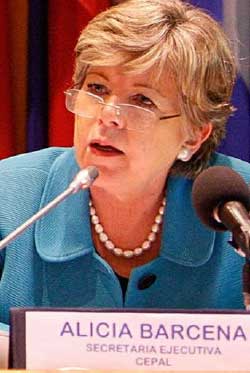Social protection systems are coming under considerable pressure with the implementation of mitigation strategies to control the spread of COVID-19 in the Caribbean. Efforts to mitigate the negative effect of the pandemic on the well-being of those most at risk are now underway across the Caribbean. Attention is being given in particular to those most economically vulnerable, notably women, youth, older persons, persons with disabilities and migrant populations.

The Economic Commission for Latin America and the Caribbean (ECLAC), as part of its outreach under the auspices of the Presiding Officers of the Regional Conference on Social Development in Latin America and the Caribbean, convened a virtual meeting on 21 April 2020 to offer countries an opportunity to share information on the actions being taken to meet this challenge, and on potential areas for collaboration and support. Representatives of Caribbean regional organizations and UN Resident Coordinators of the subregion attended as well as heads of UN agencies, funds and programmes.
Addressing the ministers of Social Development of the Caribbean, ECLAC Executive Secretary, Alicia Bárcena, underscored that “in urgent circumstances such as those we now face, it is you, the leaders responsible for social welfare, who are charged with finding solutions to the needs of those living on the street, persons with disabilities, migrants, and senior citizens”.
The meeting recognized that the crisis will affect several social sectors, including health, labour and education, with a disproportionate impact on vulnerable people with underlying health conditions, older people, unemployed youth, underemployed, women, unprotected workers and migrant workers.
In the Caribbean, medical and health facilities are insufficient for the level of potential demand and are heavily dependent on imports of equipment and inputs. This is a major problem because, to date, 24 countries around the world have restricted exports of medical equipment, medicines or their ingredients.
It is expected that COVID-19 will affect the job market by increasing unemployment and underemployment, and impact the quality of work, by reducing wages and access to social protection for the most vulnerable groups, such as informal sector workers. The loss of labour income will translate into lower consumption of goods and services, and could drive many workers into poverty.
The novel coronavirus will also disrupt activities in educational establishments, and will have a significant impact on learning, especially for children in rural areas in light of existing disparities in access to digital devices and broadband Internet. More generally, the limited access to ICT implies a low level of readiness in the subregion to operate in a virtual environment in the current crisis.
High dependency on food imports creates additional challenges in terms of food security; challenges that are further aggravated by the specific vulnerability of the Caribbean to climate-related natural disasters. Moreover, the looming 2020 hurricane season, which starts in less than three months, places the subregion and its people at greater risk, even as it grapples with the impacts of the pandemic.
In this context, it was considered urgent that policies be fully coordinated to address the health crisis, which has brought grave socio-economic impacts. ECLAC called for regional coordination and cooperation in the face of the pandemic, taking into account the Regional Agenda for Inclusive Social Development (RAISD) agreed by the member countries of the Conference in Mexico City, in October 2019.
The meeting, which was held online, was attended by ministers and senior decision makers from Anguilla, Antigua and Barbuda, Aruba, The Bahamas, Barbados, British Virgin Islands, Cayman Islands, Curaçao, Dominica, Grenada, Guadeloupe, Guyana, Haiti, Jamaica, Montserrat, Saint Kitts and Nevis, Saint Lucia, Saint Vincent and the Grenadines, Sint Maarten, Suriname, Trinidad and Tobago, Turks and Caicos Islands, and the United States Virgin Islands.
Following an introduction and presentation of the social and economic situation of the region by ECLAC Executive Secretary, Alicia Bárcena, each country representatives had the opportunity to briefly present the actions being taken by their respective governments.










![.[L-R] Parliamentary Representative for Castries Southeast, Lisa Jawahir & Talk show host, Timothy Poleon](https://thevoiceslu.com/wp-content/uploads/2026/02/Lisa-Jawahir-Timothy-Poleon-380x250.jpg)
![Public Service and Utilities Minister Stephenson King delivered remarks [Photo credit: VP]](https://thevoiceslu.com/wp-content/uploads/2026/02/Stephenson-King-380x250.jpg)

